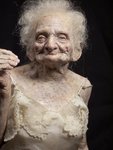|
http://www.etymonline.com/index.php goon (n.) 1921, in U.S. humorist Frederick J. Allen's piece "The Goon and His Style" (Harper's Monthly Magazine, December 1921), which defines it as "a person with a heavy touch," one who lacks "a playful mind;" perhaps a made-up word, or from gony "simpleton" (1580s), which was applied by sailors to the albatross and similar big, clumsy birds. The goons were characters in the "Thimble Theater" comic strip (starring Popeye) by U.S. cartoonist E.C. Segar (1894-1938); they appeared in Segar's strips from mid-1930s and, though they reportedly gave children nightmares, enjoyed a burst of popularity when they appeared in animated cartoons in 1938. The most famous was Alice the Goon, slow-witted and muscular (but gentle-natured) character who began as the Sea Hag's assistant. Segar might have got the word directly from sailors' jargon. Later 20c. senses of the word all probably stem from this: Sense of "hired thug" is first recorded 1938 (in reference to union "beef squads" used to cow strikers in the Pacific Northwest). She also was the inspiration for British comedian Spike Milligan's "The Goon Show." Also used among American and British POWs in World War II in reference to their German guards. What are now "juvenile delinquents" were in the 1940s sometimes called goonlets. whelp (n.) Old English hwelp "whelp, young of the dog," from a Germanic root related to Old Saxon hwelp, Old Norse hvelpr, Dutch welp, German hwelf; of unknown origin. Now largely displaced by puppy. Also applied to wild animals. Sense of "scamp" first recorded early 14c. larboard (n.) "left-hand side of a ship" (to a person on board and facing the bow), 1580s, alteration of Middle English ladde-borde (c. 1300), perhaps literally "the loading side," if this was the side on which goods were loaded onto a ship, from laden "to load" (see lade) + bord "ship's side" (see board (n.2)). Altered 16c. by influence of starboard, then, to avoid confusion of similar-sounding words, it was largely replaced by the specialized sense of port (n.1). The Old English term for it was bęcbord, literally "back board" (see starboard), a term which remains in the other Germanic tongues. tl;dr welp, larb you all, goons
|
|
|
|

|
| # ? Apr 27, 2024 02:14 |






